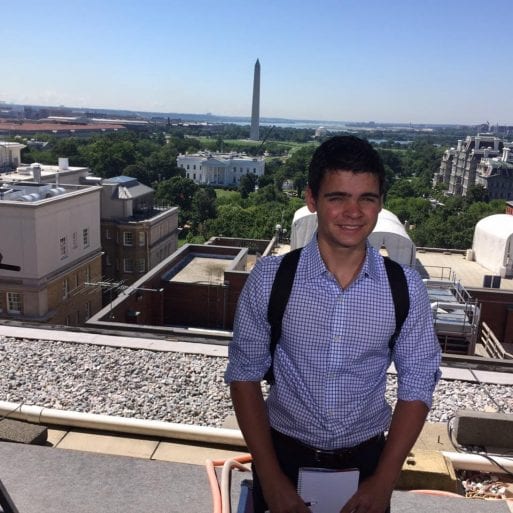
Stephen posted this photo of himself on a Washington D.C. rooftop
on his Facebook account two years ago when he was a junior
at American University
Two weeks after 23-year-old Stephen Cammarota died of complications from an autoimmune disorder in August, his father Sam sent a public tweet with a copy of an essay Stephen wrote in high school attached. The essay was about living while knowing you’re going to die, a reality Stephen faced every day since he was diagnosed with a blood disorder and immune deficiency when he was a young child.
The essay went viral. While Sam had only 675 regular followers, over 14,000 Twitter members “retweeted” the essay. In addition, it received 38,000 “likes” and 1500 replies.
Clearly, the world responded to Stephen’s thoughts about living life to the fullest even in a largely cast shadow of death. The essay is neither sentimental nor gloomy, mincing no words about our shared fate as humans.
Stephen wrote the essay when he was thought to have
At first, Stephen didn’t know what to make of this grim scenario. In the essay he says he didn’t cry nor did he get angry but admits to having been puzzled. Young people, after all, did not get cancer; even those like him, with other serious medical conditions.
The numbness vanished a week later when he says “
In the essay, Stephen sums up the result of that insight:
It was liberating…
Moving forward, Stephen was able to draw his attention away from his fear of death and focus on the time he thought he had left — which was at least six or seven years less than he actually lived. (As it turned out, Stephen’s lymphoma diagnosis was premature. His cancer symptoms were being caused by his long-chronic immune deficiency, which he tolerated through high school and graduation from American University in Washington, D.C.).

Stephen with an unidentified friend as they support children suffering from serious illnesses
Credit: Stephen Cammarota via Facebook
Young Stephen Cammarota may not have had cancer, but he still expected to live a short life due to his chronic immune deficiency. The cancer scare taught him to let go of “small stuff,” like a failed quiz or bad hair day. It convinced him to devote more time to family and the things he liked to do. According to his August 25 obituary notice, these included numerous charitable causes and giving back and raising funds for children’s hospitals and children with special needs. He furthered his volunteerism in college and chaired the first EagleTHON at American University, which raises funds for Children’s Miracle Network Hospitals.
By writing about his serious illness, Stephen Cammarota conquered his fear of death and lived the few years he had left to the fullest. By sharing Stephen’s essay after his son’s death, his father greatly furthered the positive impact his courageous son had on others. Stephen’s lesson is worth repeating: the quality of our years far outweighs their quantity. Why not retweet it as well?

 By Writing About His Illness, Young Stephen Cammarota Let Go of His Fear of Death
By Writing About His Illness, Young Stephen Cammarota Let Go of His Fear of Death



 “As Tears Go By” by Marianne Faithfull
“As Tears Go By” by Marianne Faithfull
 “The Sea” by John Banville
“The Sea” by John Banville















